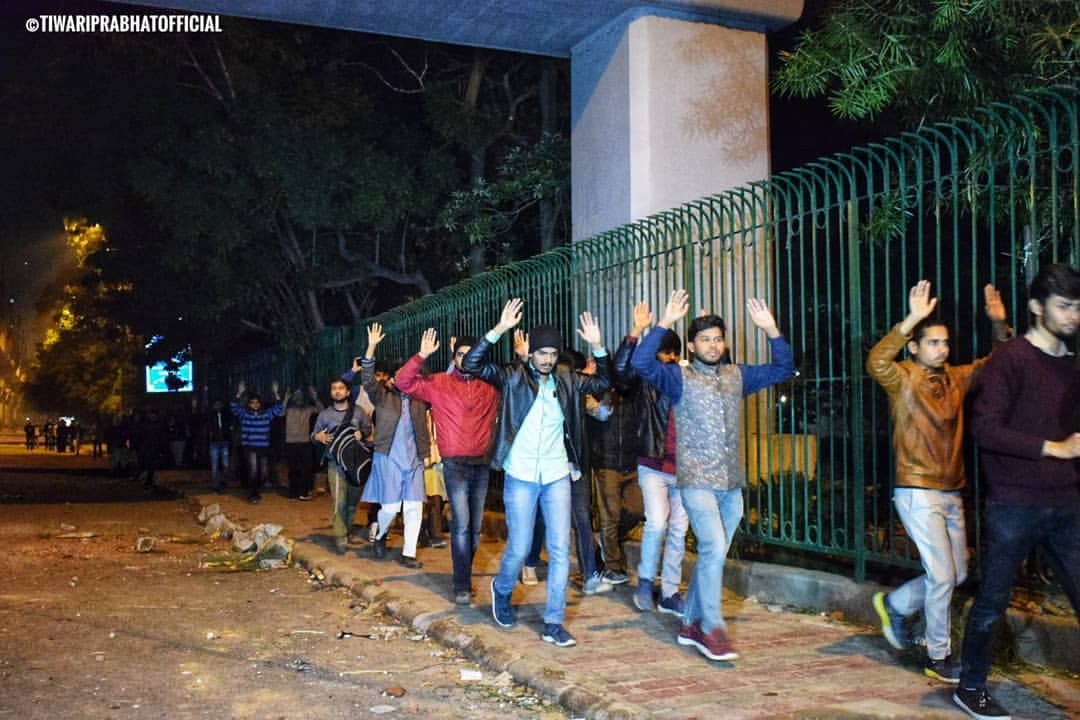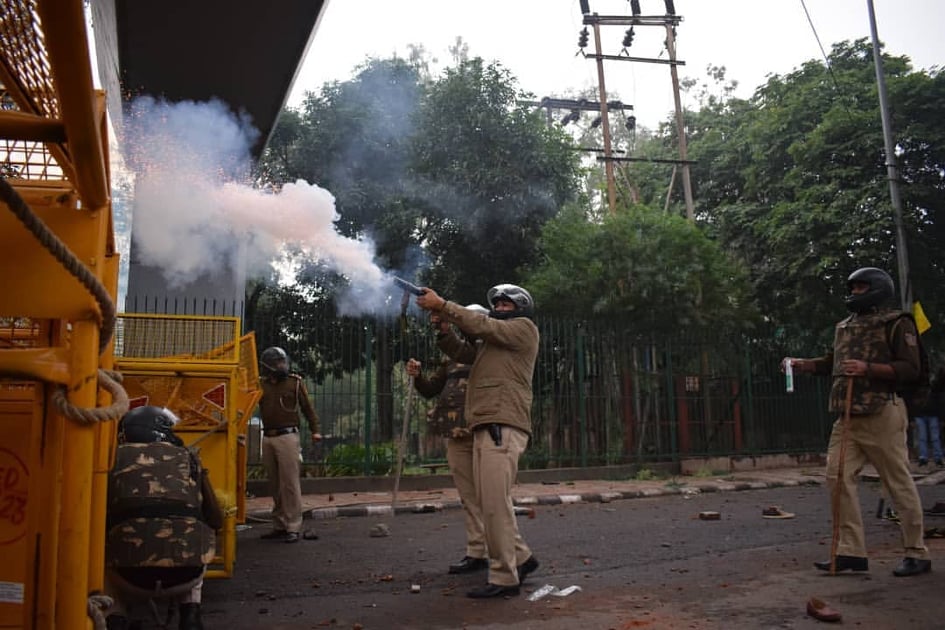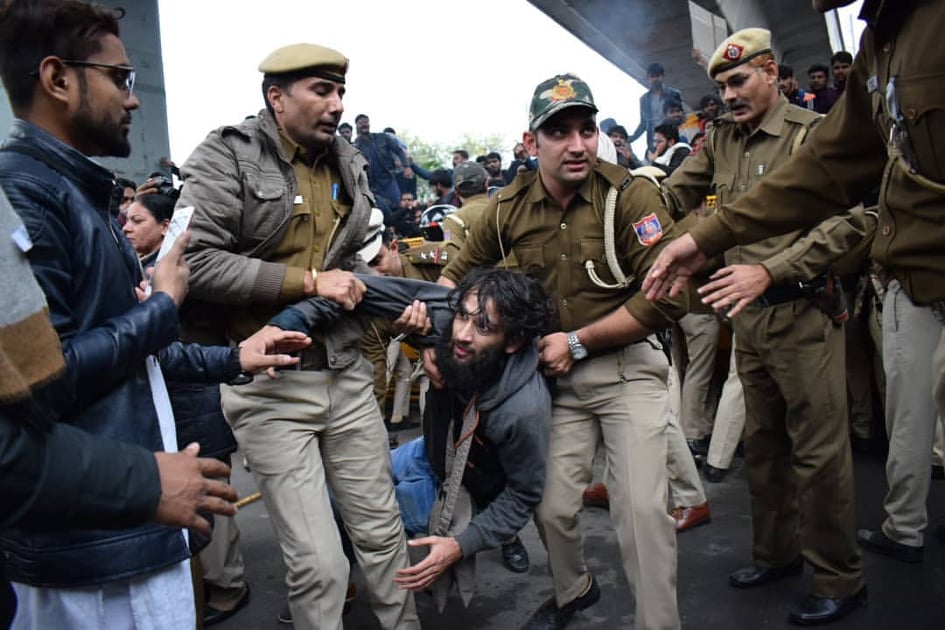"Only justice will aid in reducing our trauma," students of Jamia, AMU recount violence, hope for closure

By Huda Mohammad, TwoCircles.net
Jamia: 15 December, 2019, will be remembered as a harrowing day in the history of independent India. It was a day when the students of Jamia Millia Islamia (JMI) were peacefully protesting against the contentious Citizenship (Amendment) Act and faced a brutal crackdown by the Delhi Police inside the university premises. Besides inordinate tear-gas shelling in the campus, police also entered the University’s Central Library where students had taken refuge. CCTV footage and videos of unrestrained lathi-charge stand as evidence of police atrocity on students. Over 60 students were injured and the incident prompted international condemnation as the United Nations Secretary-General exhorted Indian authorities about the use of excessive force.
It has been more than a year since the grievous incident but Ishita, a student at Jamia Millia Islamia, can still hear the sounds of tear-gas shells that turned the campus into a war-zone. “That day, I realised how minorities are made to feel in our nation. We are hypocrites because we talk about censuring human rights violations but allow it to happen with our minorities,” she says.
Ishita equates the incident to a nightmare and is dealing with the trauma for the past past one year due to the ruling regime’s lack of accountability regarding the violent episode.
According to a report published by The Wire, the Vice-Chancellor of Jamia, Najma Akhtar stated that, “there is no point in pursuing the FIR after one year as there is no hope.” She has asked her students to focus on the future.
Farhan, a second-year Mass Communication student at JMI reckons that in order to look at the future, it is necessary to get rid of past agonies which haunt students. The police and paramilitary force patrolling outside the campus since December 12 will never allow him to do so. “Patrolling is an attempt to turn the narrative, insinuating that students are instigators of violence and even peaceful protests will be curbed immediately. These are planned manoeuvres to instil fear in people," he says and further adds, “The grave security breach of police entering the library is being treated trivially by the establishment, not realising how students are counting on justice as a refuge for their trauma.”
Several students like Farhan believe that making peace with the barbarity of December 15 would have been possible if the violence that occured in the campus was carried out by miscreants, but a larger part of the tragedy remains the involvement of the protectors of law and order in the state.
“Whenever I see the police now, I fear for my safety instead of feeling safe. This is the kind of psychological trauma we have been suffering since the incident," he said.
A report about police atrocities on Jamia students released by the National Human Rights Commission stated that Delhi Police had no option but to enter the University campus as it was under attack by stone pelters while the same report ignored the CCTV footage and testimonies of students who said that police vandalised the university campus, reported The Wire.
[caption id="attachment_440445" align="alignnone" width="945"] Police firing tear-gas in Jamia on Dec 15, 2019. Photo Credit - Prabhat Tiwari[/caption]
Police firing tear-gas in Jamia on Dec 15, 2019. Photo Credit - Prabhat Tiwari[/caption]
“Our situation continues to be pathetic. Students remain booked even after a year and getting justice for the transgression of human rights seems bleak now”, says Aman, a student of journalism.
Recounting violence at Aligarh Muslim University (AMU)
After what happened in Jamia, the second centre that raised its voice against the Citizenship (Amendment) Act was Aligarh Muslim University in Uttar Pradesh. Excessive use of force, tear gas-shells and stun grenades used by the police and Rapid Action Force left hundreds of students critically injured. Several students were detained and one student even lost his arm in the police brutality executed at the Morison Court Hostel of the university.
At AMU, Vice-Chancellor Tariq Mansoor had called the police inside the campus, stating they required help as the situation was getting out of hand. “The state machinery and the administration are working in tandem and both will do anything to support each other," says Tauheed, a student of Masters in English Literature at the university.
Not part of the then ongoing protests, Tauheed was present in the campus that day and was forced to live a memory he wishes he had never encountered in his life. “To curb the protests at Aligarh at that time became mandatory for the establishment because their motive was to silence any voice that questioned autocratic laws," he says.
Injured and jolted, students of Aligarh Muslim University were asked to vacate their hostels and go home within 36 hours. “Fear and despair grips us when I recall the horrific night. We were compelled to go alone to the stations as Section 144 was implemented. With internet and SMS services also suspended, students were left to fend for themselves”, said Ramsha, a second year graduation student.
Recently, Prime Minister Narendra Modi addressed the centenary celebration of AMU as the Chief Guest via video conferencing. “A group of university students wrote a memorandum to the Vice Chancellor, listing questions they wanted to ask the PM regarding the December 15th incident,” said Nabeel, a student of Masters in Library Sciences. However, issues of police brutality, student traumas and losses went undiscussed during the visit. “The PM engaged in what can be termed as ‘dealing’ or jumlabaazi in AMU jargon. Calling AMU ‘Mini-India’ will not benefit anyone if the austerity of the violation remains unaddressed and justice is not granted to students,” adds Nabeel.
[caption id="attachment_440443" align="alignnone" width="945"] Jamia Against CAA-NRC. Photo Credit - Prabhat Tiwari[/caption]
Jamia Against CAA-NRC. Photo Credit - Prabhat Tiwari[/caption]
The present and the future
“The quest of justice has a path and here the path is missing," says Tauheed who is afraid that constant denial of justice might weaken the spirit of student’s over a period of time.
Quoting Salman Rushdie, Ishita says, “We are a nation of forgetters. Until it does not matter to the whole country, I do not think something will be done about it.”
While some fear these traumas may crystallize in the coming years, others anticipate its alternative side too.
In November, 2020, a Delhi-based collective, Citizen Against Hate (CAH), compiled a 124-page report titled “The Dismantling of Minority Education: Police Violence in Aligarh Muslim University and Jamia Millia Islamia”. Collated after six months of field work by a team of human rights experts, lawyers and researchers, the report documents 209 testimonies along with pointing out loopholes in NHRC’s findings as it did not take several circumstantial evidences into consideration. It also mentions the psychological impact of the incident on students and family members.
Mentioning the report, Farhan believes that the only way to ensure justice is by talking and documenting testimonies of the incident. “December 15 should always be remembered either through peaceful protests or through seminars were people share their stories of facing atrocities by the state machinery and how the incident has left them traumatized," he says.
For Tauheed, "students need to figure out new peaceful and powerful measures through which they can still voice their opinion or persuade the administration to take steps towards justice."
“Justice will aid in minimising our traumas”, says Aman. “Even if the incident is effaced from memories, we will keep talking and reminding people about it. The axe might forget; the tree never does.” he added.
Huda Mohammad is a second year journalism student at AJK MCRC, Jamia Millia Islamia, New Delhi.
